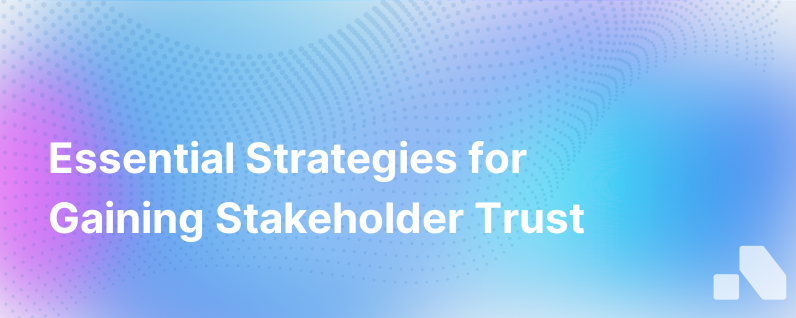How To Earn Stakeholder Trust
Published on January 8, 2024 by Sawyer Middeleer
In the world of business, stakeholder trust is an invaluable asset. Whether you're interacting with customers, business associates, employees, or investors, the ability to foster trust is a foundational cornerstone of successful relationships. However, earning, maintaining, and growing that trust is often easier said than done.
In this article, we discuss the essential steps toward building and strengthening stakeholders' trust, drawing on insights learned from working with some of the most successful organizations.
1. Reliability: Actions Speak Louder Than Words
Often, the first step to win stakeholder trust is by demonstrating consistency at every touchpoint. Are your actions, words, and decisions aligned? Consistency evokes predictability, and predictability breeds trust.
For instance, delivering on promises — from meeting small deadlines to delivering on major commitments — manifests your reliability. Every interaction offers the opportunity to prove you're trustworthy, so keep promises, follow-through with commitments, and ensure actions match words.
2. Transparency: Openness is Key
Transparency breeds trust. By open and honest communication, you can mitigate stakeholders' fears of being left in the dark, breeding a sense of trust.
This doesn't necessarily imply disclosing every detail but sharing enough information to keep stakeholders informed about the aspects that matter. In moments of crisis, being upfront about the situation and how you plan to resolve it can enhance credibility and maintain trust.
3. Integrity: Uphold Your Values and Principles
Trust is often closely linked to how stakeholders perceive your integrity. Acting ethically, even when no one's watching, upholds the principles that foundationally shape trust.
For instance, sticking to your ethics in tough business decisions or being honest when mistakes are made, promotes authenticity. This often closely ties with corporate governance, where ethical guidelines inform business decisions.
4. Empathy: Understand their Perspective
To build trust, empathize with your stakeholders. Form a genuine understanding of their needs, pain points, and what they value the most.
This implies listening actively and showing understanding rather than simply pushing your own agenda. By demonstrating empathy, you show stakeholders that they're valued and understood, which helps deepen trust in your relationship.
5. Engagement: Frequent, Two-Way Communication
Maintain regular and open communication with all stakeholders. Frequent engagement ensures stakeholders feel heard, valued, and importantly, part of the conversation.
Two-way communication nurtures symbiotic relationships, fostering trust. Stay open to feedback, invite discussion, and listen actively to their concerns.
6. Deliver Value: Meet or Exceed Expectations
The simplest way to earn stakeholder trust is by delivering valuable results consistently. Aim not only to meet but exceed expectations wherever possible. High-quality output and outstanding service encourage stakeholders to trust your abilities and your commitment to delivering value.
7. Show Gratitude: Recognize Contributions
Gratitude goes a long way in winning trust. Showing stakeholders you value and appreciate their contributions fosters goodwill, showing them they matter and their efforts are not taken for granted.
8. Responsiveness: Quick and Effective Responses
In an age where speedy communication is the norm rather than the exception, being responsive to stakeholder inquiries, complaints, or feedback is a viable way of gaining trust.
Prompt responses signal to stakeholders that you prioritize their needs and concerns. Responsiveness is not only about speed but includes providing thorough, accurate, and polite responses.
Using Aomni to Earn Stakeholder Trust
Trust, ultimately, is about providing reliable, transparent, and valuable interactions at every stage of the stakeholder relationship. Leveraging modern AI solutions like Aomni can help streamline this process. Aomni’s real-time account intelligence can give tailored insights into stakeholder behavior, trends, and needs, providing a vital edge in your trust-building strategy.
Conclusion
Stakeholder trust isn't just about winning new business or keeping existing customers. It's about creating a reputation of your brand as a reliable, transparent, ethical, and valuable partner deserving of trust. It's about making all those who've put their faith in your business — customers, employees, investors — feel validated in their decision.
By focusing on reliability, transparency, integrity, empathy, engagement, delivering value, showing gratitude, and offering quick responses, you can establish and nurture this essential asset. With tools like Aomni, you can enhance your understanding of stakeholders and tailor your efforts to earn and maintain their trust efficiently.